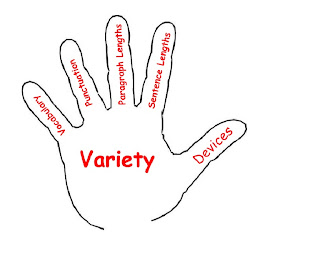Have a look at the example in red below. We've been working on creating variety in our writing through our handy (you see what I did there?) diagram:

In class we've worked on our vocabulary looking at:
Positive / Negative Vocabulary and how to create oxymoron.
Increasing our range of sophisticated vocabulary.
We've developed devices to add satire, irony and sarcasm to our writing:
Stating the Obvious
Descriptive Imagery
Making Comparissons
Hyperbole
Misdirection
Rhetorical Questions
With our sentence structures we've tried to use our skills creatively:
Varying Length
Complex Sentences with pivot in attitude.
Complex Sentences with embedded sarcastic clauses
Compound descriptive sentences leading to short high impact sentences with opinions
Our punctuation has become useful to achieve not just accuracy but effect:
Parenthetic commas, brackets and dashes
The Semi-Colon for extending imagery
The liberal use of exclamation marks.
Finally paragraphing draws our whole text together with:
Variety in length
Effective use of discourse markers.
So my challenge to you Year 11 is:
Read below and leave a comment:
What went well?
What could make this even better?
Can you remember that feeling of deep-seated panic when your
phone goes off in the cinema? The embarrassment of lifting the phone out of
your pocket to turn it off only to be illuminated in the pallid green glow of
shame and have your face melted by the glares of one hundred and fifty angry
Monster’s Inc fans (including the creepy middle aged man who doesn’t seem to
have brought children or a date). It’s hideous. It only has to happen once for
you to never want to own a phone again.
Here is the effective deterrent. Absorbing the ire of a multitude of strangers
clearly outweighs the crime of not turning your mobile off (off not silent) and
when the punishment is more severe than the crime, people tend to grow a moral
compass. This is what has happened since a Finnish designer at Nokia liberated
Alexander Graham Bell’s mouthpiece from the hall table and one unfortunate
consumer couldn’t find the off button in a screening of Jurassic Park.
Orange has a solution to this problem. To save us from the
embarrassment they make us sit through five minutes of excruciating
audio-visual hell.
Cue cringe-worthy puns, poorly thought out dialogue and the
most heinous crime of all: the solution to a problem that does not exist.
The premise: ‘Don’t let phones ruin your movie’.
Let’s examine that statement. The phone has never ruined a
film. One blast of Mozart’s 9th blared through the tinny speakers in
digital polyphonic beauty doesn’t distract me. I enjoy watching a person squirm
because all eyes are on them. The pain on their face is delightful. In fact,
I’m pretty sure the latest Bourne film would be very short without a mobile
phone. All witnesses would be dead and Jason Bourne would not have to
constantly evade the CIA because he would be untraceable. Generally, movies are
built around communication between sets of characters that 90% of the time
takes place on a mobile phone. Phones make movies.
The marketing meeting must have been brilliant for this
advert:
‘Hey – this product we sell, it ruins things – why don’t we
point it out?’
But behind this there’s a subversive attempt to sell us a
lifestyle ingrained deep within the advert, which is fantastically clever. It
builds a picture of the chief executive as a bumbling fool and the everyman
‘underling’ trying in vain to turn the situation around. The sinister twist is
we find ourselves identifying more with the boss than with the everyman. The
advert manipulates us into doubting our own intelligence, our own inbuilt
nature not to make a scene and our own natural morality in avoiding punishment.
The doubt sees our hand slowly creep towards our trousers like a toddler
desperate for a wee.
Bang. Then the advert really hits us; they present the most common
mobile phone ring tone out of sync with the advert sending hearts leaping
through mouths and hands shooting into pockets causing hours’ worth of
psychotherapy sessions because you can ‘feel the eyes on you’.
Exploiting humanities’ guilt complex is what I loathe. I
loathe it far more than the poorly constructed advert, dialogue, shots, puns
and message. I almost loathe it more than the feeling of being caught with your
phone on.
This advert is a fantastic piece of work, if you display a
deranged obsession with sadism. I can remember the deep-seated panic of when my
phone went off at the cinema and now I’m reminded of it every time I blow my
life savings on a film.
Orange – a phone didn’t ruin my movie: your advert ruined my
life.

